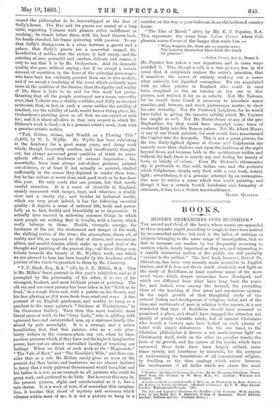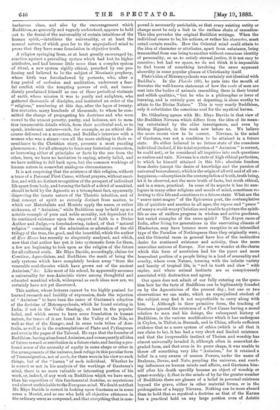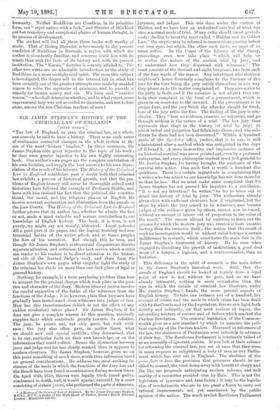BOOKS.
MODERN RESEARCHES INTO BUDDHISM.*
THE second and third of the books whose names are appended to these remarks ought, according to usage, to have been noticed by us somewhat earlier; but such is the influx of writings on subjects belonging to the same range of investigation, that we fear to nauseate our readers by too frequently recurring to matters which, deeply important as they are, and interesting to a rapidly increasing section of the public, are still probably " caviare to the million." The first book, however, that of Dr. Oldenberg, has been very recently made accessible to English readers, and if it does not throw much absolutely new light on the study of Buddhism, at least confirms many of the more novel views which deeper researches have developed, and which are different from what have long been the popu- lar, and indeed, even among the learned, the prevailing ideas of the teaching of that great and mysterious system. In the rapid growth of that thoughtful study of the natural history and development of religions belief, and of the ideas and sentiments of man in relation to the unseen, it is not wonderful that that of Buddhism should have assumed so prominent a place, and should have engaged the attention not merely of purely scientific minds, but of earnest Christiana who would, a century ago, have looked on such phases of belief with simple abhorrence. On the one hand, to the Christian philosopher it throws a not unwholesome light on. Christianity itself, while on the other its peculiar tenets, the facts of its growth, and the nature of the myths which have- encrusted those facts have been largely utilised, some times openly, and sometimes by innuendo, for the purpose of undermining the foundations of all supernatural religion,. by dwelling on the close analogy which exists between. the development of all faiths which are above the most • Buddha : his Life, his Doctrine, his 0.-der. By Dr. Hermann Oldenberg. Trans- lated from the German by W. Hoey, M.A., &c. London : Williams and Norgate. 1882. Lectures on the 0,i,ia and Growth of Reli Jim, as Illustrated by Some Points in. the History of Indian Buddhism. (Hibbert Leetarts.) By T. W. Rhys Davids. London: Williams and Norgate.1881. The Life and Legend of Grtuturna, the Buddha of the Burmese. With Annota- tions by the Right Rev. P. Bigandet,' Bahop of Ramatha. Third Edition.. London : Tritbner and Co. (Oriental Series.)
barbarous class, and also by the encouragement which Buddhism, as generally and vaguely understood, appears to hold out to the denial of the universality of certain intuitions of the +human spirit,—intuitions the universality, or at least the normal nature, of which goes far to the unprejudiced mind to prove that they have some foundation in objective truth.
A religion springing from, or at least greatly encouraged by, reaction against a prevailing system which had lost its higher attributes, and had become little more than a complex system of ritual, a new system rigidly ethical, preached by one pro- fessing and believed to be the subject of Messianic prophecy, whose birth was foreshadowed by portents, who, after a long period of seclusion and meditation, underwent a fear- ful conflict with the tempting powers of evil, and imme- diately proclaimed himself as one of those periodical visitants of earth, whose mission it was to purify and enlighten, who gathered thousands of disciples, and instituted an order of the ." religious," numbering at this day, after the lapse of twenty- five centuries, many hundreds of thousands, to whom he com- mitted the charge of propagating his doctrines and who were vowed to the utmost poverty, purity, and holiness, not to men- tion innumerable details which, from their accidental and, so to speak, irrelevant nature—such, for example, as an ethical die- -course delivered on a mountain, and Buddha's interview with a woman who was a sinner—are all the more striking in their re- semblance to the Christian story, presents a most puzzling phenomenon; for all attempts to trace any historical connection, or borrowing either of principles or facts by the one from the other, have, we have no hesitation in saying, utterly failed, and we have nothing to fall back upon, but the common workings of human nature in somewhat analogous circumstances.
It is not surprising that the existence of this religion, without s. trace of a Personal First Cause, without prayers, without sacri- fice, and with no distinct recognition of the prospect of individual life apart from body, and forming theTaith of a third of mankind, should be held by the Agnostic as a triumphant fact, apparently disproving the innate nature of the Theistic intuition, and of that concept of spirit as entirely distinct from matter, to which our Materialists and Monists apply the name, or rather -nickname, of " Animism," while Buddhism may beheld up as a notable example of pure and noble morality, not dependent for its continued existence upon the support of faith in a Divine Author and Judge,—a foreshadowing, indeed, of that " natural religion " consisting of the admiration or adoration of the old trilogy of the true, the good, and the beautiful, which the author of Ecce Homo has recently so eloquently analysed, and which, now that that author has put it into systematic forth for them, a few are beginning to look upon as the religion of the future for all cultured souls. Mr. Rhys Davids, accordingly, claims for Comtism, Agnosticism, and Buddhism the merit of being the only systems which have completely broken away "from the venerable soul-theories which have grown out of the ancient Animism," &c. Like most of his school, he apparently assumes a universality for non-Animistic views among thoughtful and educated mankind which, widespread as such ideas now are, we certainly have not yet discovered.
This author, whose lectures cannot be too highly praised for learned research and lucidity of expression, finds the rejection of" Animism " to have been the cause of Gautama's adoption of the doctrine of Metempsychosis, which he found existing in India, if not in the Vedic theology, at least in the popular belief, and which seems to have some foundation in human nature, for traces of it are found in the _Valley of the Nile, as well as that of the Ganges, and in some rude tribes of -Aus- tralia, as well as in the contemplations of Plato and Pythagoras, and even in the pages of the Talmud. He says that the founder of Buddhism, having abandoned Animism, and consequently all idea of future reward or retribution in a future state, and having a pro- found sense of the necessity of equity in some shape or other in the arrangements of the universe, took refuge in this peculiar form of Transmigration, not of souls, for there were in his view no such things, but of the " karma " of each individual. Whether he is correct or not in his analysis of the workings of Gautama's mind, there is no more valuable or interesting portion of his work, or, indeed, of any work on Buddhism which we have seen, than his exposition of this fundamental doctrine, so mysterious and almost unthinkable to the European mind. We doubt not that Mr. Rhys Davids is correct in looking upon Gantama as in some sense a Monist, and as one who held all objective existence in the ordinary sense as compound, and that everything that is com-
pound is necessarily perishable, so that every existing entity or -change must be only a link in the endless chain of causation- This idea pervades the original Buddhist writings. When the individual ceases to be, his actions, or rather his character, must entail certain results. How the Oriental mind could attaia to the idea of character or attributes, apart from substance, being transmitted from one being to another without conscious identity of personality, so as .to satisfy eternal justice, it is not easy to conceive ; but had we space, we do not think it is impossible to find traces of something involving the same apparent absurdity in some popular phases of Christianity itself.
Plato's idea of Metempsychosis was certainly not identical with Buddha's. In the Phaedo (69), he puts into the mouth of Socrates the well-known statement of how the souls of men are sent into the bodies of animals resembling them in their brutal and selfish qualities, " but he who is a philosopher or lover of learning, and is entirely pure at departing, is alone worthy to attain to the Divine Nature." This is very nearly Buddhism, only it substitutes the conscious soul for the mystical karma. •
Dr. Oldenlierg agrees with Mr. Rhys Davids in that view of the Buddhist Nirvana which differs from the idea of its mean- ing entertained by the elder investigators, and even by Bishop Bigandet, in the work now before us. We believe the more recent view to be correct. Nirvana, in the mind of Gautama, was not a condition to be attained in a future state. He either believed in no future state of the conscious individual (indeed, if his total rejection of "Animism " is correct, he could not), or he considered all inquiries into such questions as useless and vain. Nirvana is a state of high ethical perfection, to which he himself attained in this life ; absolute freedom from desire (except the desire of knowledge and the passion of universal benevolence), which is the origin of all evil amid all an- happiness,—absorption in the contemplation of truth, truth being, let it be observed, not the mere truth of facts, but truth ethical, and in a sense, practical. In some of its aspects it has its ana- logues in many other religions and moods of mind, sometimes re- ferring to this life and sometimes to a future state: What are the " suave mari magno " of the Epicurean poet, the contemplative life of quietists and ascetics in all ages, the repose and "peace " of many a world-weary Christian soul unable to picture the spirit- life as one of endless progress in wisdom and active goodness, but varied examples of the same spirit ? The Aryan races of India, after living for generations in the enervating climate of Hindustan, may have become more receptive to an intensified type of the Paradise of Nothingness than- they originally were ; and the Oriental races in general have less of the instinctive desire for continued existence and activity, than the more masculine natures of Europe. Nor can. we wonder at the charm which this form of asceticism had for the purer and more benevolent portion of a people living in a land of sensuality and cruelty, where even Nature, teeming with the infinite variety and beauty of tropical life, is " red in tooth and claw " with rapine, and where animal instincts are so conspicuously associated with destruction and agony.
Our space does not admit of our fully entering on the ques- tion how far the facts of Buddhism can be legitimately founded on by the Agnosticism of the present day ; but one or two observations we can make, which an unprejudiced student of the subject may find it not unprofitable to carry along with him, 1. Although in their primitive form, the teaching of Gautama ignored the existence of a First Cause having a moral relation to man and his doings, the subsequent history of Buddhism, in the various modifications which it has undergone in Ceylon, in Thibet,in Burmab, and in China, affords sufficient evidence that as a mere system of ethics (which is all that it can claim to be), it has had a very short and limited existence and that the irrepressible instinct of Theism and worship has almost universally invaded it, although often in somewhat de- graded form, and that even in its purer shape, it was unable to throw off something very like "Animism," for it retained a belief in a very swarm of unseen Powers, under the name of Brahman, Devas, and Nate, peopling the universe, and exert- ing influences on human minds and affairs, and Gantama him- self after his death -speedily became an object of worship or quasi-worship ; 2, that in the minds of by far the greater number of Buddhists there are gleams of a belief in personal existence beyond the grave, either in other material forms, or in the prolongation of a happy Nirvana. Nothing can be more absurd than to hold that so mystical a doctrine as that of the Karma has a practical hold on any large portion even of Asiatic
humanity. Neither Buddhism nor Comtism, in its primitive form, can "expel nature with a fork," and theories of this kind are but transitory and exceptional phases of human thought, in its process of development.
The student will find all .these three books well worthy of study. That of Bishop Bigandet refers mainly to the present condition of Buddhism in Burmah, a region with which the author is abundantly familiar, and concerns itself less with its tenets than with the facts of its history and with its present institution. The "Karma" doctrine is scarcely alluded to. The other two wcrrks are an admirable introduction to the study of Buddhism in a more metaphysical spirit.- The more this subject is investigated, the deeper will be the interest felt in what has been certainly one of the greatest attempts ever made by unaided reason to solve the mysteries of existence, and to provide a remedy for human misery and sin. We have said " unaided reason,"—who shall determine whether, and to what extent, some supernatural help was not accorded to Gautama, and not to him alone, among the non-Christian teachers of men F




































 Previous page
Previous page